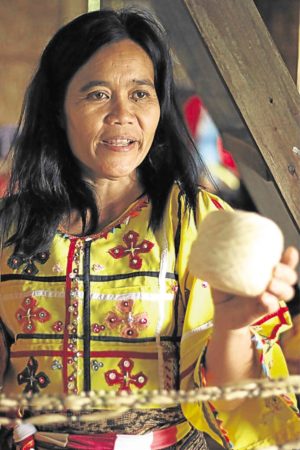When women help other women succeed
As concepts such as inclusivity and social impact continue to become more relevant to businesses, a women-focused brand platform asks: Do enterprises and corporations truly understand what it means to be inclusive?
“Inclusivity means looking at your whole supply chain, and really working with everyone and catering to their needs,” says Jeannie Javelosa, who leads the Gender-Responsive Economic Actions for the Transformation of Women (GREAT Women), a governance and capacity development project that aims to promote and support a gender-responsive enabling environment for women’s economic empowerment, particularly among microenterprises.
As a brand platform, GREAT Women’s focus is to merge capacity development and enterprise collaborations to provide women-owned businesses access to markets.
The weaving industry is one key beneficiary of GREAT Women.
The brand platform partners closely with 40 weaving communities across the country, many of whom are indigenous peoples, by preparing these microentrepreneurs to access more markets for them to sell their products.
“These textiles and crafts are often created deep within their community territories, which can be a challenge to reach because of lack of farm-to-market roads. So the initial step is to make them realize that there are different kinds of markets, and markets beyond their place,” Javelosa says.
“There is also the lack of production capacity and market quality standards, so it takes a long process working with each community,” she adds.
And in the course of their work with these indigenous communities, Javelosa says they discovered a perennial problem: slow production speed.
“When we asked our weavers in Iloilo why they were working at a slow pace, they said, because we can’t see very well,” Javelosa says. “The handloom weaving process is so intricate that they need eyeglasses to see.”
GREAT Women immediately addressed the issue by providing weavers with prescription eyeglasses, with the help of other partners.
One such partner—another woman helping her fellow women—is Trish Panlilio, the restaurateur behind Mulberry Door and its catering arm, nawwTy’s Kitchen.
From Oct. 17 until end of December, 20 percent of the proceeds from the purchase of select menu items will be donated to GREAT Women to help fund eye exams and prescription glasses for the Bagobo-Tagabawa (in the south) and Ibaloi (from the north) community weavers.
Those who do not need glasses can use the funds to buy spools of thread.
“So that’s what we mean by inclusivity,” Javelosa adds. “And by giving them what they need, we are also helping the business.”
The selected food from Mulberry Door include chipirones, bone marrow onion soup, mushroom chicken asiago served with sourdough bread, callos with garlic baguette, Luca’s chicken kiev with mashed potatoes, eggplant parmigiana with ciabatta, and lemon carbonara.
The partnership with GREAT Women is part of nawwTy’s Kitchen Gives Back, a series of benefit dinners that Panlilio is hosting in Mulberry Door.
“We are happy to be partnering with the GREAT Women platform because our rich indigenous Filipino culture is something to be proud of, and its preservation is something that we openly ought to support,” Panlilio says.
Along with promoting local heritage, GREAT Women is also pushing slow fashion.
Their weavers’ creations now have more timeless designs, says Javelosa, which one can wear every day, to encourage consumers to purchase only the clothes they need.
Shangri-La Plaza is another partner of the brand platform in this movement—on Oct. 24-27, the mall is hosting People’s Pride: An Indigenous Inspired Cultural Fair.
Joining GREAT Women at the fair are Angie’s Yakan Collection, Cowhed of the T’boli, Melting Pot Collab of the Mangyan, Arkat Lawanen of the Maranao, Rolyolikha Handicrafts from Mindoro and Rurungan sa Tubod Foundation from Palawan. Brands inspired by indigenous peoples and products such as Akaba, Manila Collectible, LARA, Aishe, and Ninofranco, and designers Rhett Eala and Jor-El Espina will also be there.
“The event blends together the inspired lifestyles of both contemporary and traditional, and allows the general public to help become caretakers of our land, culture and communities,” Javelosa says.
